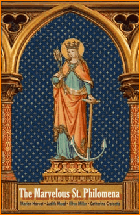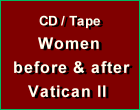Objections
The Author You Praised Took Part
in an Abortion
Fr. Sretenovic responds:
Dear Mrs. Higgins,
First of all, thank you very much for your kind and thoughtful response to my book review.
What you write, especially concerning what the author describes as "perforation" in the chapter you mention, is most grave and disturbing. When I read that chapter before writing my review, in the latter stages of the book, I already had such a high opinion of the author and the book itself that it did not even occur to me that she could have actually been assisting in an abortion.
Reading it again after receiving your note, however, there is little doubt that what you write is true. And, while I did not see it then, now I agree that the term "perforation" at times is used to describe what happens in a birth abortion.
While the author does show some disapproval of such a procedure, it is clear that she was assisting the doctor as the doctor could not perform the whole procedure himself and the mother certainly was in no state to do so, and probably would not even if she were. The author was the "assisting nurse," so to speak, and no excuses or arguments can excuse this direct participation in such a monstrous act.
While it is true that she did baptize the baby, and later defended herself for having done so – a bit too much one could add – this is still no excuse, as the only morally viable option in such circumstances is to attempt a C-section birth, even if the likelihood is there of failure.
The practice of being there to baptize the child, while good in that respect for the child, is not good for anyone else, as the mother's conscience can then be falsely appeased with the thought that, no matter the murder of the child, the baby is going to Heaven.
This would apply as well to the midwife. It would have been better for Lisbeth, having been warned earlier in the book by her priest never to call upon that doctor, as you pointed out, to do what she could in the difficult childbirth, and otherwise allow both mother and child to die rather than risk the very real likelihood that this doctor, upon arrival, would kill the baby in the attempt to save the mother's life. This is, in fact, what happens, and from Lisbeth's own words, what she was expecting to happen when she called the doctor.
I am sorry that I missed this as it is very misleading and seriously undermines the credibility of the author, as well as the value of the book, otherwise very good in many parts.
As for your other objection, I would agree that there were times in which one could say that there was too much information, unnecessary details that do not help to make the point but rather make it read as a more lively story. More discretion could certainly have been shown by the author in her recounting of such situations, especially since, as you mentioned, she could not have known as much as she communicated unless she were there.
What this does show is that there are few, if any, who have not been corrupted in some way by the poisons of Modernism and Modernity during the revolutionary process that has been going on for centuries. This is not said to excuse the author, but only to highlight that a Catholic midwife, otherwise so devoted to her work and so focused on bringing new lives into the world, was not immune from the rationalizations of a society at war with God.
I leave it to the discretion of prospective readers whether or not, in light of what has been written here, they still want to read the book for what they can gain from it, or simply find something else better to read.
Fr. Paul Sretenovic

Posted September 26, 2017
______________________

______________________
______________________
















I hope you don't mind that I email you directly. It is about a review you wrote for the book All for the Love of Mothers. Whilst I have always enjoyed your articles, especially the one you wrote some time ago on Humanae Vitae and its bad effect on the family, I have to disagree with your overall view of this book.
I read the book whilst expecting one of my children and do not deny that it is very engaging to a point. However there is something I would like to point out (this is from memory, as I no longer have the book).
The author, Lisbeth Burger, assisted at an abortion
Burger describes how she gets some Holy Water and, before the murder, she baptizes the child in utero. Burger had described earlier in the book that she had been warned by her priest never to call the particular doctor with whom she was working that day. Notwithstanding, she does call that doctor and she assists at the late term abortion.
This was the moment at which, in considerable shock, I left the book down. Apart from this awful story, for which Burger has no remorse but rather justifies her actions because the mother's life was at risk, there are several other issues I noticed.
Using this chapter again as an example, Burger seemed to have been able to recount with accuracy the most detailed and lurid discussions between a young man and the older woman he seduced. This was information far beyond her knowledge as an attending midwife, and tended to suggest to me a rather excitable imagination.
In my opinion this book is a dangerous one as, amid the Catholic truths, there lies this act of savagery. The words abortion and craniotomy are not mentioned, but the action is described clearly and could lead others into following suit, thinking this was good Catholic practice.
Perhaps if you have time you could revisit this chapter and let me know what you think? I do hope you don't mind that I bring this objection to your attention.
God bless you and all your work,
Mrs. J. Higgins, England